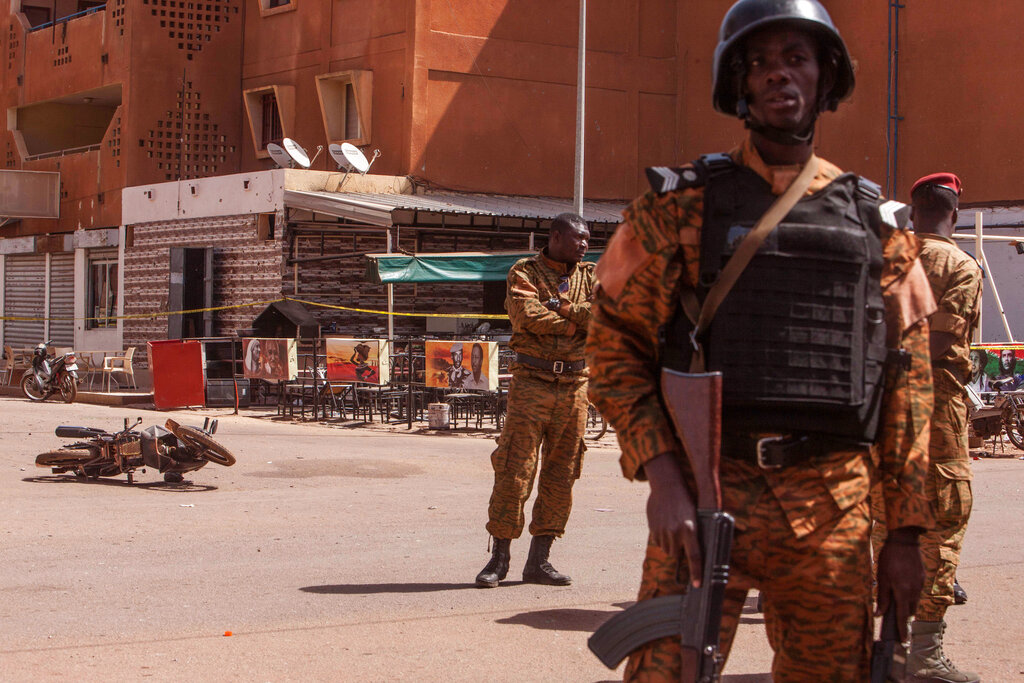Experts are alarmed at growing violence in the Sahel and the possibility of extremist groups consolidating gains to form a terror state.
Last year, Burkina Faso was the country most affected by terrorism worldwide, according to the Global Terrorism Index, and armed groups now control more than half of the country. Mali was ranked third and Niger 10th.
The military juntas in these countries used insecurity to justify seizing power. However, terrorist attacks in the region have doubled and resulting deaths have tripled since 2021, analyst Michael DeAngelo wrote for the Foreign Policy Research Institute. Extremists have taken control of large swaths of territory, including key roads, threatening the capitals of each country.
“If the insurgencies continue gaining strength at their current rate, they will be positioned to force the government out of population centers,” DeAngelo wrote. “This would render these countries collapsed states and allow jihadist groups to establish an Islamist state.”
DeAngelo reported that the Sahelian countries have adopted heavy-handed counterterrorism strategies that do not align with the reality of the insurgencies. He and other analysts have urged a shift to a more population-centric counterinsurgency strategy that emphasizes building relationships and addressing local grievances. They must provide security and effective governance in affected communities to address the drivers of the insurgencies, including the lack of economic opportunities, DeAngelo wrote.
The juntas have also left the Economic Community of West African States (ECOWAS) and formed the Alliance of Sahel States. ECOWAS has offered to welcome the junta-led countries back to the regional bloc.
Omar Hama, a civilian living in Niger, told the BBC he wished the countries had remained in ECOWAS, while simultaneously belonging to the alliance. “I would have liked them to overcome their differences because we have a common space, same people with historical similarities and same economic realities,” Hama said.
In Burkina Faso, Cisse Kabore, a civilian who lives in Ouagadougou, told the BBC she wanted her country to remain in ECOWAS because now the region “will no longer be united as before.” Researchers say that ECOWAS is the best-integrated of Africa’s eight regional economic groups.
Rotimi Olawale, a political affairs analyst in Nigeria, said the Sahel states cannot survive long without their neighbors. “Right now, they have strong support in their countries, [so] they will ride on that support, but I anticipate that as economic challenges pile up, insecurities very high, citizens will demand real solutions to local problems, and with that they need a lot of support from external stakeholders, including ECOWAS,” Olawale told Voice of America.
Terror groups, particularly the al-Qaida-linked Jama’at Nusrat al-Islam wal-Muslimin (JNIM) and the Islamic State-Sahel Province (IS Sahel), are intent on expanding to coastal West Africa. Populations there share the same challenges as Sahelian nations, including ethnic tensions and a lack of state presence in some areas, which the groups exploit.
JNIM has expanded its activity to Benin, Côte d’Ivoire and Togo. According to DeAngelo, JNIM and IS Sahel have recruited militants from these countries, as well as Ghana, Mauritania and Senegal, by appealing to ethnic groups like the Fulani, which the juntas say they will protect.
“Jihadist groups might be able to export their insurgencies if they continue to grow stronger in the Sahel,” DeAngelo wrote. “They have stated their intention to do so and will likely take advantage of any openings.”
DeAngelo offered several recommendations for Sahelian countries to counter the insurgencies:
* Hold territories with a consistent security force presence in ungoverned areas, especially in the tri-border area of Burkina Faso, Mali and Niger.
* Rejoin ECOWAS and welcome international troops back to the region, including those from the United Nations.
* Enhance governance in rural areas prone to jihadist incursions.
* Pursue negotiations to demobilize jihadists and ease ethnic tensions.
* Avoid paying ransom to release hostages as ransoms are a primary funding source for insurgents.

